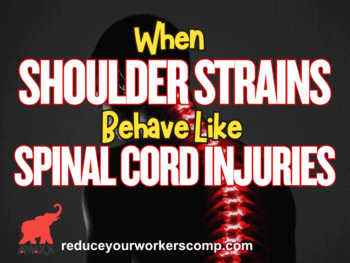
The unfortunate reality of life is sometimes a person goes to work in the morning and does not come home. The claim management team members need to be prepared for handling “death claims” and follow the correct procedures to ensure the correct workers’ compensation benefits are paid promptly. It is also essential all interested stakeholders address these claims with the utmost respect and dignity. Failure to implement best practices can result in needless litigation and unnecessary costs.
Issues to Address at the Time of Death
There are several essential issues the claims team needs to address at the time of death. It all starts with preparing insureds to ensure they follow the correct procedures. Failure to do so can result in the loss of critical evidence and penalties:
- Treat the remains of the deceased employee with respect and dignity. This is someone’s son/daughter, husband/wife/partner, and father/mother;
- Preserve the accident scene and contact the police and emergency personnel. Document everything to ensure all evidence related to the workers’ compensation claim is properly preserved. Do not interfere with law enforcement and emergency services when they arrive;
- Contact the immediate next of kin and report the unfortunate incident. This should be someone listed on the emergency contact form completed by the employee; and
- Contact the state industrial commission and/or OSHA and ensure the workplace death is reported. Most states require “severe injuries,” and workplace deaths are reported within 24 hours.
Respect and dignity are fundamental. The claim management team can help educate their insureds on best practices.
Determining Issues of Compensability
A complete investigation will need to be completed upon receiving the report of workplace death. Given the infrequency of deaths in the workplace, successful claim teams have dedicated units to handle these incidents. Issues that need to be resolved as part of any investigation include:
- Compensability of the death claim: Workers’ compensation statutes generally allow death claims to be denied when the injury is self-inflicted or the result of suicide. In cases where the cause of death is not clear-cut, it is crucial to allocate resources wisely to examine all factors that may have resulted in the workplace. Other possible defenses include “prohibited acts;.”
- Who are eligible dependents: Workers’ compensation statutes generally provide wage loss benefits to spouses of the employee and their dependent children. It is vital to examine whether the employee was married and living with the surviving spouse. Scrutiny should be given to evidence the deceased and their spouse was estranged and not living together. Issues concerning dependent children can get tricky, too; and
- Termination of benefits: State statute governs the length the insurance carrier is required to pay a specific benefit. It is essential to understand what triggers the termination of a benefit following the death of an employee. These triggers can also be very fact dependent.
Death claims present unique challenges for members of the claim management team. It can also create uncomfortable questions that need to be asked. Never assume anything. Trust, but verify. Always be respectful.
Understand Benefits Available to the Survivors
There are numerous workers’ compensation benefits available to surviving family members of an employee following a workplace death. While these benefits vary in each jurisdiction, there is a general agreement on how and when benefits are paid:
- Wage loss benefits are payable to the spouse and surviving dependents through the age of majority. It is crucial to understand how and when these benefits can be terminated. Wage loss benefits can also be payable to the employee’s parents in certain circumstances;
- Retraining and vocational rehabilitation benefits the spouse if they need to return to the workplace or find a higher paying job;
- Payment of burial expenses, which are usually capped by statute; and
- Payments to the estate of the deceased employee.
Attorneys practicing in workers’ compensation are generally not wholly familiar with handling death claims, given the frequency at which they occur. When selecting defense counsel, it is important to better understand their experience and access to resources to ensure you, as the claim handler, are selecting the best attorney.
Conclusions
Death claims present unique challenges for members of the claim management team. This is because they do not occur with a high frequency like a back injury and create situations where one must act with care and compassion. When they do occur, it is important to implement a protocol to ensure that the death is timely reported and that a complete investigation takes place. It may also require working within a specialized unit to ensure all benefits are paid to the survivors.
 Author Michael Stack, CEO Amaxx LLC. He is an expert in workers’ compensation cost containment systems and helps employers reduce their workers’ comp costs by 20% to 50%. He works as a consultant to large and mid-market clients, is a co-author of Your Ultimate Guide To Mastering Workers Comp Costs, a comprehensive step-by-step manual of cost containment strategies based on hands-on field experience, and is the founder & lead trainer of Amaxx Workers’ Comp Training Center, which offers the Certified Master of Workers’ Compensation national designation.
Author Michael Stack, CEO Amaxx LLC. He is an expert in workers’ compensation cost containment systems and helps employers reduce their workers’ comp costs by 20% to 50%. He works as a consultant to large and mid-market clients, is a co-author of Your Ultimate Guide To Mastering Workers Comp Costs, a comprehensive step-by-step manual of cost containment strategies based on hands-on field experience, and is the founder & lead trainer of Amaxx Workers’ Comp Training Center, which offers the Certified Master of Workers’ Compensation national designation.
Contact: mstack@reduceyourworkerscomp.com.
Workers’ Comp Roundup Blog: http://blog.reduceyourworkerscomp.com/
©2022 Amaxx LLC. All rights reserved under International Copyright Law.
Do not use this information without independent verification. All state laws vary. You should consult with your insurance broker, attorney, or qualified professional.
















